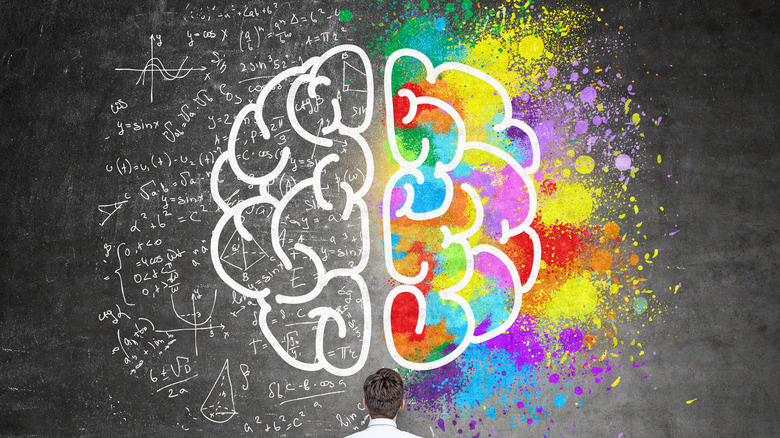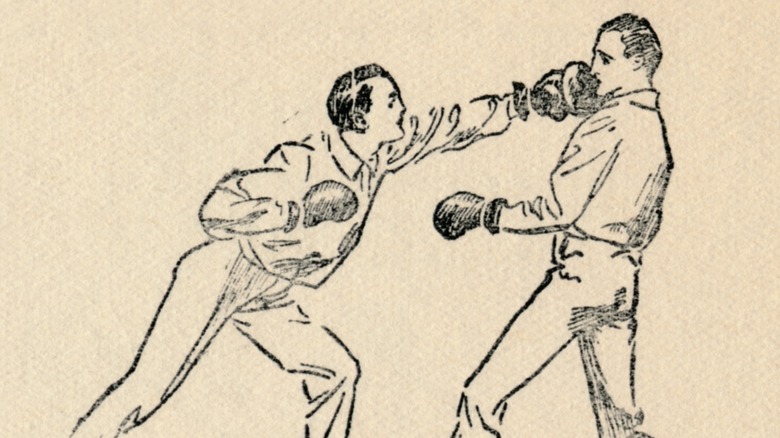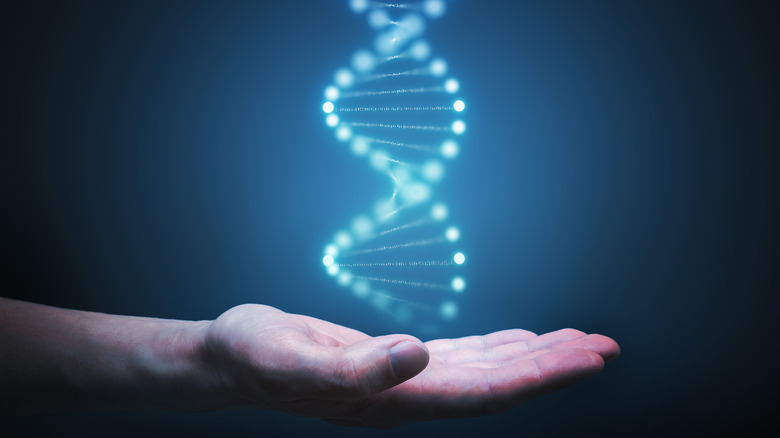The Biological Origins Of Left-Handedness
Southpaw, goofy-footed, port siders: These are just a handful of the colorful nicknames and descriptions used for left-handed people. And of course, there's "sinister," a Latin word that once just meant "left," and took on its whole "evil" definition in the 15th century, per Etymonline.
Being left-handed still carries plenty of stigmas. Per History Extra, as late as 1903 the "father of criminology" Cesare Lombroso (1835-1909) wrote, "[As] man advances in civilization and culture, he shows an always greater right-sidedness as compared to ... women and savage races." Plenty of left-handed folks have anecdotal stories about their grandmother, uncle, or maybe even themselves being forced to write right-handed in school. In Islamic tradition, as IslamQA says, the left hand is associated with blowing your nose, cleaning yourself after using the toilet, and so forth. In Norway, shoddy jobs are "left-handed work," per Cultura Colectiva. The world over, left-handedness is equated with everything from loopy behavior and mental disorders to high intelligence and enhanced creativity. Every left-handed person also has stories about the struggles of spiralbound notebooks, scissors, circular saws, and other tools built for the majority.
But here's the thing: Evolution doesn't select for traits unless they're advantageous. Per the BBC, 10-12% percent of all of humanity is left-handed. What exactly is the biological cause of them being left-handed?
Not as simple as 'right-brain dominant'
To unravel the question of handedness, we've got to look at human physiology and remember a basic fact: the right half of the brain regulates the left side of the body, and vice-versa. The brain is largely asymmetrical. Each side contains "loci," or centers, of various processes related to spatial reasoning, linguistic capabilities, logical-mathematical reasoning, and so on. In general, the left side of the brain tends to process language, and the right side issues of pattern recognition like remembering faces. But as The Conversation summarizes, things are more complex than that.
It's a vast oversimplification to make the often-quoted statement that left-handers are "right hemisphere-dominant" and right-handers are "left-hemisphere dominant." For instance, 70% of all left-handers still primarily process language in the left hemisphere. Someone who is left-handed can easily be deft at understanding semantic nuance, listening carefully, composing sentences — "language-related" skills — even though they favor their left hand for physical tasks. In other words, such skills involve empathy, problem-solving, and deeply enmeshed meaning-making that can't possibly be clustered in one magic "language spot."
Enter the corpus callosum: the bundle of nerves that connects the two halves of the brain. In non-right-handed people (including those of varying degrees of ambidexterity), the corpus callosum is actually thicker, making it easier to communicate across both hemispheres, per Neuroscience News. The issue? This might be a consequence of the left-handed having to make do in a right-handed world rather than a "cause" of left-handedness.
A survival advantage in nature
The link between cognitive capabilities and preferring to use one's hands for physical tasks — handedness — is more detached than commonly believed, and not anywhere nearly as simple as "left-handed person is good at art," "right-handed person is good at math." Left-handed people's neurology develops as they navigate through a world at odds with their preferences. That should mean that handedness evolved not in relationship to mental tasks, but physical ones, right?
It turns out folks who say "being a lefty gives you an advantage" in baseball, hockey, martial arts, and other physical activities might have inadvertently hit the nail on the head. It's easy to see how the physical challenges of certain sports closely resemble those physical challenges that our ancestors faced when hunting, running, fighting, chasing prey, and so on. This is true no matter how exercise enthusiasts, yoga practitioners, or the like gripe about differences in balance, strength, flexibility, and proprioception (a sense of your body in space) between sides of the body.
As Daniel M. Abrams discusses at TED-Ed, left-handedness might have arisen out of the hostile, competitive, natural environment early humans lived in. Favoring one side of the body might have meant that someone was less predictable in combat, or stalked differently while hunting, for example. That might have given such a person enough of an advantage to survive and pass on their genes to the next generation.
The genetic component
This brings us to our last point: genetics. In his TED-Ed talk, Abrams mentions the very obvious problem with the "competition created left-handedness" argument. If it's as simple as that, then there should be an equal 50/50 split of people in the world who are right- and left-handed. Traits that produce an advantage ought to create more people with that advantage, and in the end, it's no longer advantageous. Perhaps not enough time has passed, nor enough generations born, for handedness to even out. Or perhaps human cooperation and tool-sharing evened out the left-handed advantages. Or maybe there's some baseline mixture of genetics that wind up producing the same 10-12% of left-handed people in the world.
Babies in the womb show a preference for hands even before they're born. However, identical twins don't always prefer the same hands, as Live Science points out. As Smithsonian Magazine reports, mutations in the PCSK6 gene are associated with being right-handed, but can't fully account for it. In the end, this means that there's probably a whole bunch of genes and mutations at play, during in utero development, that account for handedness. This jives with other recent research about things we thought were simple switches like blue eyes. Even an attribute so seemingly simple comes from over 16 different genes. How much more complex is being left-handed?
Truths will likely come to light in coming years. Until then, respect the southpaws.



